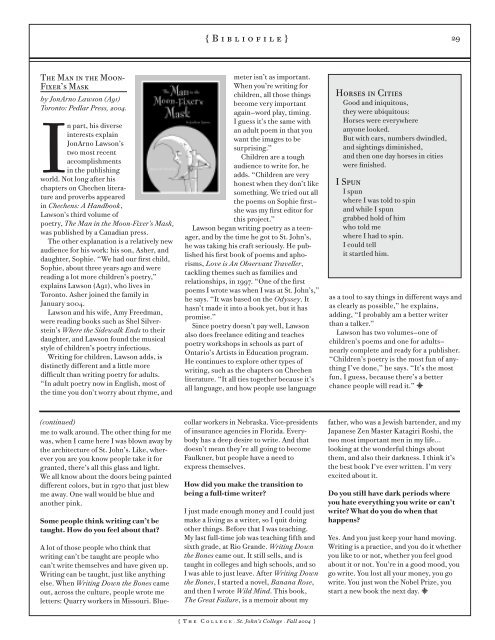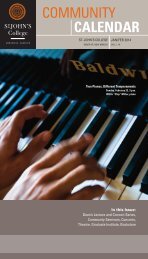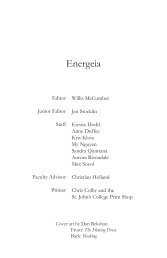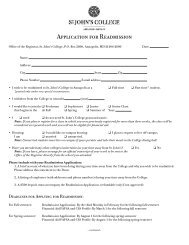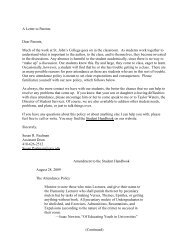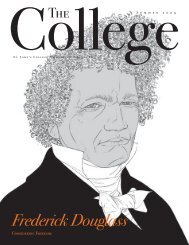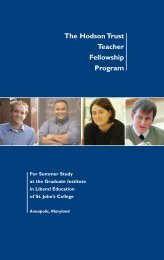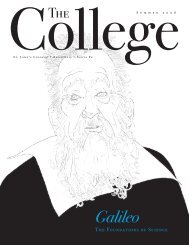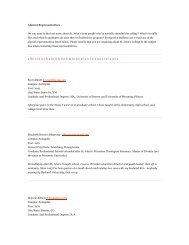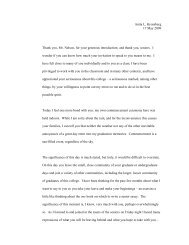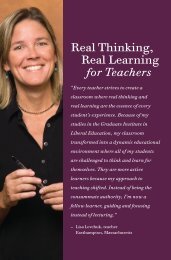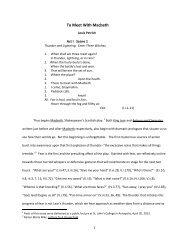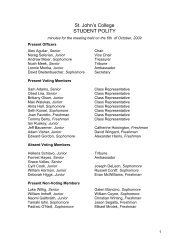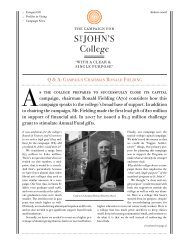Magazine - summer 03 - St. John's College
Magazine - summer 03 - St. John's College
Magazine - summer 03 - St. John's College
You also want an ePaper? Increase the reach of your titles
YUMPU automatically turns print PDFs into web optimized ePapers that Google loves.
{Bibliofile} 29<br />
The Man in the Moon-<br />
Fixer’s Mask<br />
by JonArno Lawson (A91)<br />
Toronto: Pedlar Press, 2004.<br />
In part, his diverse<br />
interests explain<br />
JonArno Lawson’s<br />
two most recent<br />
accomplishments<br />
in the publishing<br />
world. Not long after his<br />
chapters on Chechen literature<br />
and proverbs appeared<br />
in Chechens: A Handbook,<br />
Lawson’s third volume of<br />
poetry, The Man in the Moon-Fixer’s Mask,<br />
was published by a Canadian press.<br />
The other explanation is a relatively new<br />
audience for his work: his son, Asher, and<br />
daughter, Sophie. “We had our first child,<br />
Sophie, about three years ago and were<br />
reading a lot more children’s poetry,”<br />
explains Lawson (A91), who lives in<br />
Toronto. Asher joined the family in<br />
January 2004.<br />
Lawson and his wife, Amy Freedman,<br />
were reading books such as Shel Silverstein’s<br />
Where the Sidewalk Ends to their<br />
daughter, and Lawson found the musical<br />
style of children’s poetry infectious.<br />
Writing for children, Lawson adds, is<br />
distinctly different and a little more<br />
difficult than writing poetry for adults.<br />
“In adult poetry now in English, most of<br />
the time you don’t worry about rhyme, and<br />
meter isn’t as important.<br />
When you’re writing for<br />
children, all those things<br />
become very important<br />
again—word play, timing.<br />
I guess it’s the same with<br />
an adult poem in that you<br />
want the images to be<br />
surprising.”<br />
Children are a tough<br />
audience to write for, he<br />
adds. “Children are very<br />
honest when they don’t like<br />
something. We tried out all<br />
the poems on Sophie first—<br />
she was my first editor for<br />
this project.”<br />
Lawson began writing poetry as a teenager,<br />
and by the time he got to <strong>St</strong>. John’s,<br />
he was taking his craft seriously. He published<br />
his first book of poems and aphorisms,<br />
Love is An Observant Traveller,<br />
tackling themes such as families and<br />
relationships, in 1997. “One of the first<br />
poems I wrote was when I was at <strong>St</strong>. John’s,”<br />
he says. “It was based on the Odyssey. It<br />
hasn’t made it into a book yet, but it has<br />
promise.”<br />
Since poetry doesn’t pay well, Lawson<br />
also does freelance editing and teaches<br />
poetry workshops in schools as part of<br />
Ontario’s Artists in Education program.<br />
He continues to explore other types of<br />
writing, such as the chapters on Chechen<br />
literature. “It all ties together because it’s<br />
all language, and how people use language<br />
Horses in Cities<br />
Good and iniquitous,<br />
they were ubiquitous:<br />
Horses were everywhere<br />
anyone looked.<br />
But with cars, numbers dwindled,<br />
and sightings diminished,<br />
and then one day horses in cities<br />
were finished.<br />
I Spun<br />
I spun<br />
where I was told to spin<br />
and while I spun<br />
grabbed hold of him<br />
who told me<br />
where I had to spin.<br />
I could tell<br />
it startled him.<br />
as a tool to say things in different ways and<br />
as clearly as possible,” he explains,<br />
adding, “I probably am a better writer<br />
than a talker.”<br />
Lawson has two volumes—one of<br />
children’s poems and one for adults—<br />
nearly complete and ready for a publisher.<br />
“Children’s poetry is the most fun of anything<br />
I’ve done,” he says. “It’s the most<br />
fun, I guess, because there’s a better<br />
chance people will read it.” x<br />
(continued)<br />
me to walk around. The other thing for me<br />
was, when I came here I was blown away by<br />
the architecture of <strong>St</strong>. John’s. Like, wherever<br />
you are you know people take it for<br />
granted, there’s all this glass and light.<br />
We all know about the doors being painted<br />
different colors, but in 1970 that just blew<br />
me away. One wall would be blue and<br />
another pink.<br />
Some people think writing can’t be<br />
taught. How do you feel about that?<br />
A lot of those people who think that<br />
writing can’t be taught are people who<br />
can’t write themselves and have given up.<br />
Writing can be taught, just like anything<br />
else. When Writing Down the Bones came<br />
out, across the culture, people wrote me<br />
letters: Quarry workers in Missouri. Bluecollar<br />
workers in Nebraska. Vice-presidents<br />
of insurance agencies in Florida. Everybody<br />
has a deep desire to write. And that<br />
doesn’t mean they’re all going to become<br />
Faulkner, but people have a need to<br />
express themselves.<br />
How did you make the transition to<br />
being a full-time writer?<br />
I just made enough money and I could just<br />
make a living as a writer, so I quit doing<br />
other things. Before that I was teaching.<br />
My last full-time job was teaching fifth and<br />
sixth grade, at Rio Grande. Writing Down<br />
the Bones came out. It still sells, and is<br />
taught in colleges and high schools, and so<br />
I was able to just leave. After Writing Down<br />
the Bones, I started a novel, Banana Rose,<br />
and then I wrote Wild Mind. This book,<br />
The Great Failure, is a memoir about my<br />
father, who was a Jewish bartender, and my<br />
Japanese Zen Master Katagiri Roshi, the<br />
two most important men in my life…<br />
looking at the wonderful things about<br />
them, and also their darkness. I think it’s<br />
the best book I’ve ever written. I’m very<br />
excited about it.<br />
Do you still have dark periods where<br />
you hate everything you write or can’t<br />
write? What do you do when that<br />
happens?<br />
Yes. And you just keep your hand moving.<br />
Writing is a practice, and you do it whether<br />
you like to or not, whether you feel good<br />
about it or not. You’re in a good mood, you<br />
go write. You lost all your money, you go<br />
write. You just won the Nobel Prize, you<br />
start a new book the next day. x<br />
{ The <strong>College</strong> • <strong>St</strong>. John’s <strong>College</strong> • Fall 2004 }


